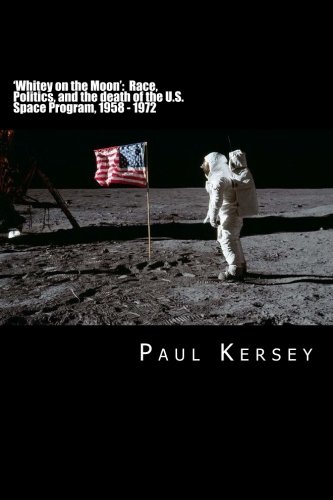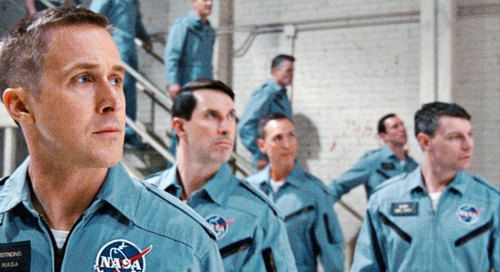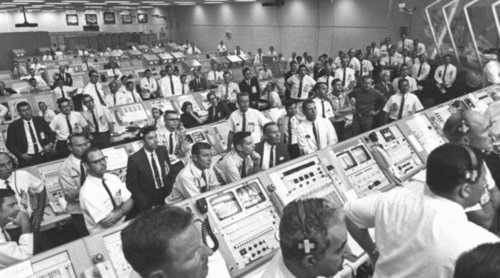

By Paul Kersey
10/26/2018

Breitbart.com got it wrong. [Neil Armstrong Movie Starring Canadian Ryan Gosling Doesn’t Feature American Flag, by Justin Caruso, August 30, 2018] But then, civic nationalists do tend to get it wrong when it comes to defending the Historic American Nation. First Man, the biopic of Apollo astronaut Neil Armstrong, powerfully played by Ryan Gosling, is a must-see movie. It depicts a time before America had to be made great again — when Whitey was indeed on the moon
First Man rinses away the bad taste that Hidden Figures left in the mouths of those who still believe historical accuracy matters in cinema That 2016 film historically revised the Mercury and Apollo programs with a Politically Correct fairy tale: three sassy black women single-handedly got Armstrong and his crew to the moon. More preposterous than Black Panther’s Wakanda — and Black Panther is comic-book fiction.
Unfortunately, legions of would-be moviegoers — including President Trump himself — boycotted First Man because it did not include planting of the American flag on the moon.[Donald Trump says he won’t see 'First Man' due to omission of planting the American flag on the moon, by Tyler McCarthy, Fox News, September 5, 2018] To be fair, Ryan Gosling himself fumbled the question:
Gosling was asked at the Venice Film Festival whether omitting the scene was deliberate and the actor attempted to sidestep the question by responding that the moon landing “transcended countries and borders.”
“I think this was widely regarded in the end as a human achievement [and] that’s how we chose to view it,” he told reporters. "I also think Neil was extremely humble, as were many of these astronauts, and time and time again he deferred the focus from himself to the 400,000 people who made the mission possible.”
[Ryan Gosling Defends Neil Armstrong Biopic 'First Man' Leaving Out American Flag In Moon Landing Scene, by Ryan Gaydos, Fox News, August 31, 2018]
Stigmatizing First Man as anti-American, globalist propaganda was catnip for civic nationalists and Armstrong’s boomer colleagues in the space program. Tweeted Gen. Chuck Yeager: “More Hollywood make-believe” and “That’s not the Neil Armstrong I knew.” Buzz Aldrin tweeted a picture of his and Armstrong’s planting the flag on the moon with the hashtag #ProudToBeAnAmerican.
#proudtobeanAmerican #freedom #honor #onenation #Apollo11 #July1969 #roadtoApollo50 pic.twitter.com/gApIwLzaJw
— Dr. Buzz Aldrin (@TheRealBuzz) September 3, 2018
With the conservative media united in painting First Man as anti-American, the movie’s opening weekend hauled in $16 million against a $59 million production budget. Breitbart was quick to crow about the film’s flop: Box Office Fail: Flag-Free ‘First Man’ Flops, by John Nolte, Breitbart.com, Oct. 15, 2018.]

Compare that disappointing debut to Hidden Figures. The latter opened with $22 million but ultimately pulled in a domestic gross of $169 million against a production budget of $25 million.
One possible reason: Few whites in America take their own side in an argument these days, having been conditioned to believe their history is a celebration of racial supremacy and the subjugation of non-whites. Did that cause them, reflexively but perhaps unconsciously, to avoid a legitimate cinematic celebration of white American ingenuity and accomplishment? Or did they boycott the film because of the flag scene? Or both?
In fact, Old Glory is ubiquitous in First Man, particularly with the gorgeous panorama of the Apollo lunar module on the moon and the flag positioned next to it — an awe-inspiring moment that beautifully captured the solitude of the lunar adventure. Of course, you’d have to see the film to know that.
Beyond that, First Man is less about Apollo 11 and the triumph at Mare Tranquillitatis than about Neil Armstrong’s devotion to duty. Let’s not forget that Armstrong was a badass Navy pilot in Korea who flew 78 missions. The emotional pull of First Man is the loss Armstrong feels when his young daughter dies of cancer, and how he is haunted by her memory, even seeing her revenant as the children of other astronauts play.
This catharsis might not have happened, but it reminds us that what became one of the most significant moments in American history, was, for Armstrong, just another day at the office. [‘First Man’ Shows Neil Armstrong Mourning His daughter On The Moon. But Did That Really Happen?, by Christian Davenport, The Washington Post, October 16, 2018]
But let’s get to the reason critics didn’t like the film: It was the anti-Hidden Figures story.
Indeed, we are now at a point where the Hidden Figures myth somehow delegitimizes the Apollo 11 mission because the movie is insufficiently peopled with blacks. Consider this review [emphases added]:
Once again, Americans are making movies about that time we went to the moon. Two years ago, “Hidden Figures” kicked off a mini rebirth of the genre, with a look at how racism caused NASA’s space program to hide the real geniuses behind the Apollo missions. This year’s “First Man” is a far more traditional (and far more white male focused) look at America’s path to the moon — with a possibly unintended underlying message.
“First Man” trailers make it seem kind of like a 2018 version of "The Right Stuff.” The dramatic retelling of the Gemini and Apollo space programs feels like it was supposed to be a testament to American ingenuity. But what the movie ultimately reveals is not American exceptionalism, but rather American hubris. As we relive the glory days of the space program, we are also treated to an inside look at how the richest, most scientifically advanced Western nation burned through billions of dollars in order to accomplish a single-minded, seemingly crazy objective. And how they accomplished it, almost in spite of themselves.
['First Man,' Starring Ryan Gosling, Is A Reminder That American Hubris Propelled Us To The Moon, Not Exceptionalism, by Ani Bundel, NBC News, Oct. 13, 2018]
With apologies to Ms. Bundel, and also to the civic nationalists who boycotted the movie, First Man powerfully reminds us of the days when the Historic American nation took Manifest Destiny into space. But back then, we were unburdened by countless hours of diversity seminars, and lectures about racial intolerance, structural inequality, white privilege and implicit bias.
First Man celebrates an old-fashioned American hero, the kind whose exploits are now vilified by CultMarx ideologues seeking to undermine our past because too few non-whites were in positions of authority.
One remarkable scene features the Gil Scott-Heron poem Whitey On The Moon, recited just before the launch of the Apollo 11 — a scene, by the way, more mesmerizing than the launch of the Saturn V depicted in Apollo 13. Juxtaposed with shots of the astronauts about to launch and NASA’s white employees preparing to man mission control in Houston, the actor depicting Scott-Heron recites the anti-white poem as one of Armstrong’s sons raises the American flag in front of his home.
Although director Damien Chazelle says he didn’t intend it, the poem should remind everyone of the non-white opposition to the most incredible achievement in human history — only sixty-five years after the Wright brothers’ first flight, we were on the moon:
“At first, I planned to re-create a prelaunch protest using archival photographs as reference, re-creating the signs, and using a speech that would articulate some of the opposition to the space race,” he tells Fast Company via email. “But during prep, Ryan sent me the Gil Scott-Heron track, and the two of us realized this could be an even more powerful and singular way of distilling and communicating those arguments.”
Chazelle adds, “It was really important for me to show the debate surrounding the space program at the time, show audiences that there was not complete support behind the program, and try to do justice to the passionate and certainly understandable arguments against it. It raised real questions about national priority at a time when cities were reeling, Vietnam protests were sweeping across the country, and poverty was being talked about more and more.”
[Why Damien Chazelle Chose One Of The Most Politically Radical Songs In History For ‘First Man’ by Marcus Baram, Fast Company, October 15, 2018]
The import of Whitey On The Moon today? We aren’t supposed to celebrate the achievements of white men anymore, but instead wallow in nauseating self-hatred and celebrate as Leftist totalitarians pull down Confederate statues and rename streets, bridges and schools after Malcolm X, Cesar Chavez, Martin Luther King, and, of course, Barack Hussein Obama. [Los Angeles Votes to Rename Street After Barack Obama: ‘It’s Official’, People, August 30, 2018]

Civic nationalists can boycott “First Man” if they want. But the movie stands as a testament to what once made our country so great.
Liberals are embarrassed by America’s past; Conservatism Inc. fears embracing it because that would require admitting the country was better off when whites ran things and weren’t mandated to feel guilt about “privilege.”
The real Americans who put Trump in office don’t think that way. But unhappily, as we approach the 50th anniversary moon landing on July 20, 1969, more and more will believe a handful of black women were responsible for the achievement, and fewer and fewer will be able to name the man who took that “giant leap for mankind.”
But First Man does remember. And so it inadvertently provides a glimpse of the ethos Trump has tried to recapture with his epochal slogan “Make America Great Again” — with its power, appeal, and, ultimately, sadness.
Paul Kersey is the author of the blog SBPDL, and has published the books SBPDL Year One, Hollywood in Blackface and Escape From Detroit, Opiate of America: College Football in Black and White and Second City Confidential: The Black Experience in Chicagoland. His latest book is The Tragic City: Birmingham 1963-2013.
This is a content archive of VDARE.com, which Letitia James forced off of the Internet using lawfare.